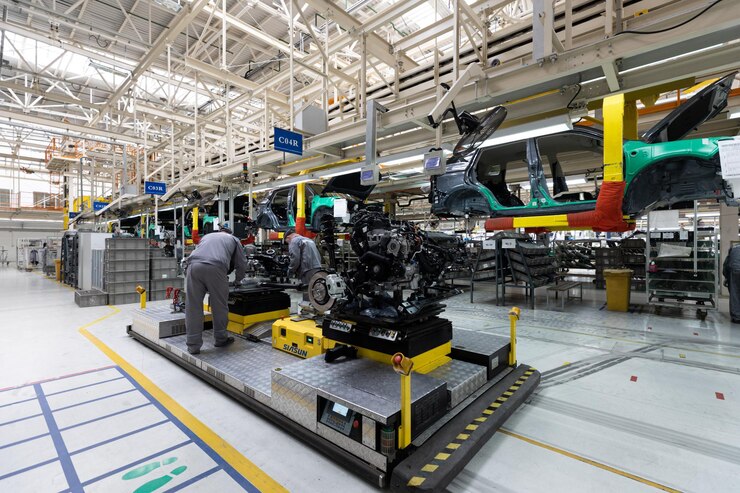The automotive industry, a constant presence on our roads, also offers a dynamic and rewarding career path. But is it the right fit for you? Buckle up, as we delve into the world of auto manufacturing, exploring its potential and addressing considerations for those seeking a fulfilling career.
A Transforming Landscape:
The auto industry is undergoing a significant metamorphosis. Gone are the days of solely gas-powered vehicles. Electric vehicles (EVs), autonomous driving, and a focus on sustainability are shaping the future. This translates to exciting opportunities for individuals with the right skillset and a passion for innovation.
Diverse Career Avenues:
Auto manufacturing isn’t limited to assembly lines. It encompasses a wide range of specializations, ensuring there’s something for everyone. Here’s a glimpse into the varied career paths:
- Engineering: This forms the backbone of the industry. From design engineers conceptualizing new vehicles to manufacturing engineers optimizing production processes, engineers play a crucial role.
- Production: This involves the hands-on creation of vehicles. Skilled professionals operate complex machinery, ensuring quality and efficiency.
- Quality Control: Maintaining high standards is essential. Quality control inspectors meticulously examine vehicles at various stages of production, identifying and resolving issues.
- Supply Chain Management: A smooth flow of parts is vital. Supply chain managers oversee the procurement, logistics, and inventory management of the numerous components that go into a car.
- Research and Development (R&D): Pushing the boundaries of technology is key. R&D professionals work on cutting-edge advancements, developing new materials, and refining existing technologies.
Advantages of a Career in Auto Manufacturing:
- Lucrative Opportunities: The Bureau of Labor Statistics reports an average annual wage of $59,970 for all positions involved in motor vehicle manufacturing [1]. Several specialized roles within the industry offer highly competitive salaries.
- Job Security: The transportation sector is a fundamental requirement, making auto manufacturing a relatively stable career choice.
- Skill Development: This industry offers ample opportunities to learn and grow. From technical skills like operating sophisticated machinery to soft skills like problem-solving and teamwork, individuals can continuously enhance their professional repertoire.
- Hands-on Experience: For those who enjoy working with their hands and seeing tangible results, auto manufacturing provides a fulfilling work environment.
Factors to Consider:
- Educational Requirements: While some entry-level positions require a high school diploma or vocational training, engineering and other specialized roles necessitate a bachelor’s degree in relevant fields like mechanical engineering or automotive engineering.
- Work Environment: Manufacturing facilities can involve physically demanding tasks, working long hours, and potentially working in loud environments.
- Automation: The increasing adoption of automation might lead to a decrease in certain manual labor jobs. However, this also creates a demand for individuals skilled in operating and maintaining complex machinery.
Future Outlook:
The auto industry is expected to see moderate growth, with the Bureau of Labor Statistics projecting a 2% employment increase from 2016 to 2026 [2]. The shift towards EVs and autonomous vehicles will require a workforce equipped with the necessary skills to navigate these technological advancements.
Aligning Your Passions:
Beyond the objective factors, consider your personal interests. Are you fascinated by how cars work? Do you enjoy problem-solving and working with your hands? If so, this field could be a great fit.
Getting Started:
- Research and explore the different specializations within the industry.
- Consider pursuing relevant education and training. Numerous vocational programs, community colleges, and universities offer programs in automotive technology, engineering, and related fields.
- Gain experience through internships or entry-level positions. This will provide valuable hands-on experience and allow you to network within the industry.
Conclusion:
The auto manufacturing industry offers a stable and rewarding career path with diverse opportunities for growth. If you’re passionate about innovation, enjoy working with your hands, and are eager to be part of a rapidly evolving field, then this might be the right road for you. Remember, continuous learning and upskilling are crucial to staying ahead of the curve in this dynamic industry.
Word count: 898
Additional Points to Consider:
- The environmental impact of the auto industry is a growing concern. Companies are increasingly focusing on sustainable practices, creating opportunities for individuals passionate about the environment to contribute to positive change within the sector.
- The global nature of the automotive industry opens doors for individuals seeking international career opportunities.
By carefully considering your interests, skills, and the evolving landscape of the auto industry, you can make an informed decision about whether this path aligns with your career goals.

